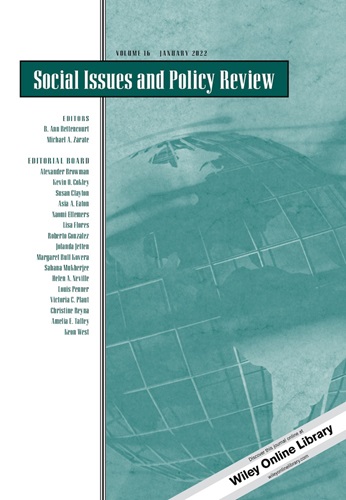在地方、国家和国际层面采用基于人权的方法解决气候不公正问题:计划和政策建议
IF 5.6
1区 心理学
Q1 PSYCHOLOGY, SOCIAL
引用次数: 0
摘要
气候危机威胁并侵犯了发展、教育、食品、健康、住房、生命、有意义的知情参与、自决和用水等人权。气候不公正指的是一些社区如何在气候变化的负面影响中首当其冲,却又责任最小。本文采用注重保护和参与权的人权方法,审查了基于年龄、残疾、种族、性别认同、地理、收入、土著认同、移民身份、种族、难民和境内流离失所者身份及其交叉因素的气候不公正现象。政策建议包括加强气候教育、利用分类数据和扩大心理健康服务。本文贯穿始终的主题是:气候变化与其他危机相互关联,从而加剧了不平等;以第一线社区的声音为中心,多元化的跨学科和国际视角与知识对于解决气候危机至关重要。本文章由计算机程序翻译,如有差异,请以英文原文为准。
A human rights‐based approach to climates injustices at the local, national, and international levels: Program and policy recommendations
The climate crisis threatens and violates human rights to development, education, food, health, housing, life, meaningful and informed participation, self‐determination, and water. Climate injustices refer to how some communities are shouldering the disproportionate brunt of the negative effects of climate change while being the least responsible. With a human rights‐based approach focused on protection and participation rights, this paper reviews climate injustices based on age, disability, ethnicity, gender identity, geography, income, Indigenous identity, migratory status, race, refugee and internally displaced status, and their intersections. Policy recommendations include increasing climate education, utilizing disaggregated data, and expanding mental health services. Cross‐cutting themes throughout the paper are that climate change is interconnected with other crises, thereby compounding inequalities, and that a diversity of interdisciplinary and international perspectives and knowledge centered on the voices of frontline communities are essential for addressing the climate crisis.
求助全文
通过发布文献求助,成功后即可免费获取论文全文。
去求助
来源期刊

Social Issues and Policy Review
Multiple-
CiteScore
22.20
自引率
1.10%
发文量
9
期刊介绍:
The mission of Social Issues and Policy Review (SIPR) is to provide state of the art and timely theoretical and empirical reviews of topics and programs of research that are directly relevant to understanding and addressing social issues and public policy.Papers will be accessible and relevant to a broad audience and will normally be based on a program of research. Works in SIPR will represent perspectives directly relevant to the psychological study of social issues and public policy. Contributions are expected to be review papers that present a strong scholarly foundation and consider how research and theory can inform social issues and policy or articulate the implication of social issues and public policy for theory and research.
 求助内容:
求助内容: 应助结果提醒方式:
应助结果提醒方式:


